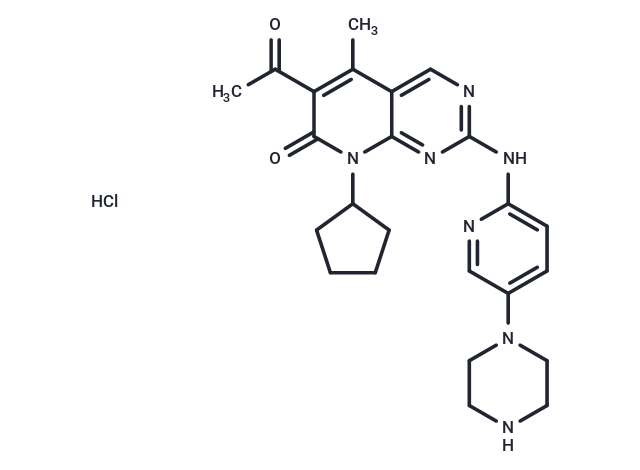Shopping Cart
- Remove All
 Your shopping cart is currently empty
Your shopping cart is currently empty

Palbociclib monohydrochloride (PD 0332991 hydrochloride) is a selective inhibitor of CDK4/6 (IC50s: 11/16 nM). It exhibits no inhibition against a panel of 36 additional protein kinases.

| Pack Size | Price | Availability | Quantity |
|---|---|---|---|
| 2 mg | $30 | In Stock | |
| 5 mg | $48 | In Stock | |
| 10 mg | $63 | In Stock |
| Description | Palbociclib monohydrochloride (PD 0332991 hydrochloride) is a selective inhibitor of CDK4/6 (IC50s: 11/16 nM). It exhibits no inhibition against a panel of 36 additional protein kinases. |
| Targets&IC50 | CDK4-CyclinD1:11 nM (cell free), CDK6-CyclinD2:15 nM (cell free), CDK4-CyclinD3:9 nM (cell free) |
| In vitro | PD 0332991 is a highly specific inhibitor of Cdk4 (IC50, 0.011 micromol/L) and Cdk6 (IC50, 0.016 micromol/L). It is a potent antiproliferative agent against retinoblastoma (Rb)-positive tumor cells in vitro, inducing an exclusive G1 arrest, with a concomitant reduction of phospho-Ser780/Ser795 on the Rb protein [1]. In all of the cell lines except KP-MRT-YM, PD 0332991 inhibited cell proliferation >50% (IC50 values 0.01 to 0.6 μM), and induced G1-phase cell cycle arrest. The sensitivity of the MRT cell lines to PD 0332991 was inversely correlated with p16 expression. KP-MRT-YM cells overexpress p16 and were resistant to the growth inhibitory effect of PD 0332991 [2]. Cell lines representing luminal estrogen receptor-positive (ER+) subtype (including those that are HER2 amplified) were most sensitive to growth inhibition by PD 0332991 while nonluminal/basal subtypes were most resistant [3]. |
| In vivo | Oral administration of PD 0332991 to mice bearing the Colo-205 human colon carcinoma produces marked tumor regression. Therapeutic doses of PD 0332991 cause elimination of phospho-Rb and the proliferative marker Ki-67 in tumor tissue and down-regulation of genes under the transcriptional control of E2F [1]. |
| Kinase Assay | CDK assays for IC50determinations and kinetic evaluation were performed in 96-well filter plates. All CDK-cyclin kinase complexes were expressed in insect cells through baculovirus infection and purified as described previously. The substrate for the assays was a fragment (amino acids 792–928) of pRb fused to GST. The total volume for each well was 0.1 ml containing a final concentration of 20 mM Tris-HCl, pH 7.4, 50 mMNaCl, 1 mM dithiothreitol, 10 mMMgCl2, 25 μM ATP (for CDK4-cyclin D1, CDK6-cyclin D2, and CDK6-cyclin D3) or 12 μM ATP (for CDK2-cyclin E, CDK2-cyclin A, and CDC2-cyclin B) containing 0.25 μCi of [γ-32P]ATP, 20 ng of enzyme, 1 μg of GST·RB-Cterm, and appropriate dilutions of inhibitor. All components except the [γ-32P]ATP were added to the wells, and the plate was placed on a plate mixer for 2 min. The reaction was then started by adding the [γ-32P]ATP, and the plate was incubated at 25?°C for 15 min. The reaction was terminated by addition of 0.1 ml of 20% trichloroacetic acid, and the plate was kept at 4?°C for at least 1 h to allow the substrate to precipitate. The wells were then washed five times with 0.2 ml of 10% trichloroacetic acid, and radioactive incorporation was determined with a β plate counter. Kinase assays for PDGFr, FGFr, EGFr, SRC, and PKC kinases were performed as described previously [4]. |
| Cell Research | Cells were seeded at 2 × 10^4 per well in a 96-well Cytostar T plate and incubated overnight to allow cells to attach. Varying concentrations of PD 0332991 were added to the wells and incubated for 24 hours at 37°C. [14C]thymidine (0.1 μCi) was added to each well and incorporation of the radiolabel was allowed to proceed for 72 hours. Incorporated radioactivity was determined with a β plate counter [1]. |
| Animal Research | Mice (18–22 g) were randomized and then implanted s.c. with tumor fragments (~30 mg) into the region of the right axilla. Treatment was initiated when tumors reached 100 to 150 mg. PD 0332991 was given according to the schedule and dose indicated in the table and figure legends by gavage as a solution in sodium lactate buffer (50 mmol/L, pH 4.0) based on mean group body weight. In all experiments, there were 12 mice in the control group and 8 mice each in the treated groups. Additional details for each experiment are given in the table legends [1]. |
| Alias | PD 0332991 hydrochloride, Palbociclib hydrochloride, Palbociclib (PD-0332991) HCl |
| Molecular Weight | 483.99 |
| Formula | C24H29N7O2·HCl |
| Cas No. | 827022-32-2 |
| Smiles | Cl.CC(=O)c1c(C)c2cnc(Nc3ccc(cn3)N3CCNCC3)nc2n(C2CCCC2)c1=O |
| Relative Density. | no data available |
| Storage | keep away from moisture,keep away from direct sunlight | Powder: -20°C for 3 years | In solvent: -80°C for 1 year | Shipping with blue ice. | ||||||||||||||||||||||||||||||
| Solubility Information | DMSO: 5 mg/mL (10.33 mM), Sonication is recommended. H2O: 20 mg/mL (41.32 mM), Sonication is recommended. | ||||||||||||||||||||||||||||||
Solution Preparation Table | |||||||||||||||||||||||||||||||
DMSO/H2O
H2O
| |||||||||||||||||||||||||||||||

Copyright © 2015-2025 TargetMol Chemicals Inc. All Rights Reserved.